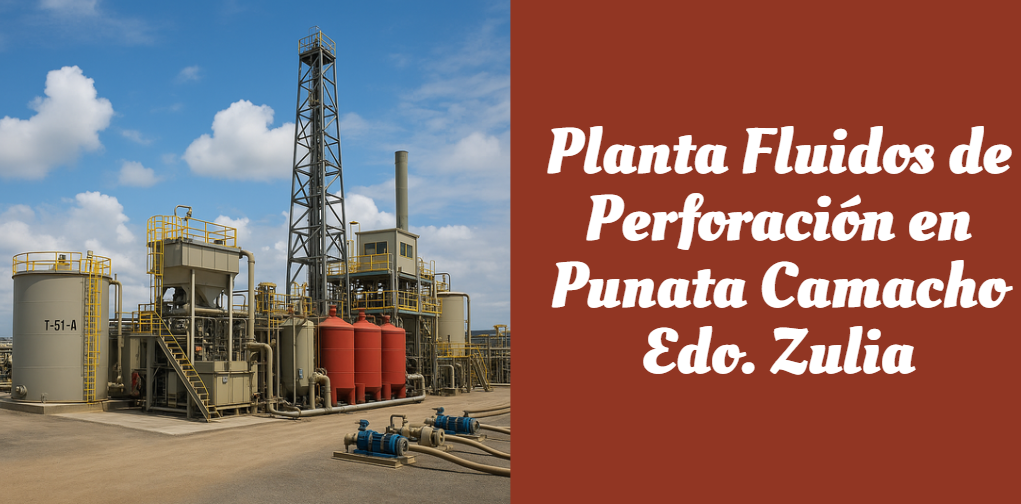Planta Fluidos de Perforación en Punata Camacho Edo. Zulia: A Comprehensive Insight
The planta fluidos de perforación en Punata Camacho Edo. Zulia plays a vital role in Venezuela’s oil and gas ecosystem. Strategically located in the resource-rich state of Zulia, this drilling fluids plant supports petroleum operations by providing essential chemical compounds used in the drilling process. Its proximity to active oil fields makes it a key contributor to regional and national energy production.
This article offers a deep dive into the plant’s purpose, structure, operations, and the role it plays in sustainable energy practices. With Venezuela’s long-standing history in oil, understanding the logistics and science behind drilling fluids is critical to appreciating the country’s broader petroleum infrastructure.
Understanding Drilling Fluids
Drilling fluids—often referred to as “mud” in the oil industry—are specialized liquids used in the process of drilling into the earth to reach oil and gas reserves. These fluids are far more than simple lubricants. They perform several vital functions:
- Cooling and lubricating the drill bit, reducing wear.
- Transporting rock cuttings to the surface for disposal.
- Maintaining pressure in the borehole to prevent blowouts.
- Stabilizing the wellbore to prevent collapse.
The planta fluidos de perforación en Punata Camacho Edo. Zulia is designed specifically to manufacture, test, and deliver these complex fluid systems.
Types of Drilling Fluids
| Fluid Type | Base Material | Common Use |
|---|---|---|
| Water-based | Fresh or salt water | Most common; cost-effective and less toxic |
| Oil-based | Diesel or mineral oil | Ideal in challenging formations |
| Synthetic-based | Synthetic esters or olefins | Used for enhanced environmental safety |
Overview of the Punata Camacho Facility
Situated in the municipality of Camacho within Zulia State, the Punata Camacho drilling fluids plant serves as a hub for logistics and chemical processing in the western oil belt. It was established to reduce the reliance on imported fluids and to meet the rising demand from national and international drilling contractors working in the region.
With several nearby oil fields in the Lake Maracaibo basin, its geographical location is strategic. This proximity reduces transportation costs, improves response time for operational demands, and promotes regional economic development.
Facility Components and Infrastructure
The planta fluidos de perforación en Punata Camacho Edo. Zulia features a modern, modular infrastructure, enabling it to scale operations quickly. Here’s an overview of its main components:
- Production Area: Equipped with industrial mixers and storage tanks for raw materials and finished products.
- Control Center: Where operators use digital interfaces to manage formulation and blending processes.
- Waste Management Units: Designed to treat used fluids and minimize environmental damage.
- Laboratory Facilities: These ensure product quality meets industry standards through physical and chemical testing.
This integrated design ensures a smooth workflow from material intake to product shipment.
Technological Advancements
Modern drilling operations demand precision and environmental compliance. The plant incorporates several advanced technologies:
- Automated Mixing Systems: Allow exact measurement and blending of additives.
- Real-Time Monitoring: Provides data on viscosity, density, and chemical composition to ensure consistency.
- Separation Technologies: Remove solid contaminants from reusable fluids.
- Eco-Friendly Additives: The plant increasingly uses biodegradable and non-toxic chemicals.
These features allow the plant to meet the stringent demands of clients, while also aligning with global best practices for sustainability.
Operational Processes
The operations at the planta fluidos de perforación en Punata Camacho Edo. Zulia follow a structured workflow designed for efficiency and safety. The steps include:
- Material Procurement: The plant sources barite, bentonite, polymers, and other additives.
- Formulation: Based on the drilling site’s needs, custom formulations are prepared.
- Mixing and Quality Control: Ingredients are blended under strict supervision and tested for performance.
- Packaging and Logistics: Final products are either delivered in bulk tanks or sealed containers to drill sites.
Each stage involves precise engineering to meet the technical requirements of deep well drilling.
Environmental and Safety Practices
Environmental safety is paramount in oil field operations. The Punata Camacho plant complies with both national and international standards. Its environmental policy includes:
- Effluent Treatment Systems to purify wastewater.
- Solid Waste Recycling programs that recover valuable chemicals.
- Emission Control Systems to monitor and reduce airborne pollutants.
On the safety side, all employees undergo rigorous training in hazardous material handling, emergency response, and equipment operation. Regular audits ensure the plant stays in line with ISO 14001 and OHSAS 18001 standards.
Economic and Social Impact
The planta fluidos de perforación en Punata Camacho Edo. Zulia contributes significantly to the local and national economy. Its economic influence can be summarized as follows:
- Direct Employment: Engineers, technicians, and administrative staff from the region.
- Indirect Employment: Through contracts with transporters, suppliers, and service companies.
- Technology Transfer: Skills and knowledge passed to the local workforce.
- Community Development: The plant funds local education and healthcare initiatives through CSR programs.
This economic interconnection promotes long-term growth in Zulia’s energy sector.
Challenges and Future Outlook
Like all industrial facilities, the plant faces ongoing challenges:
- Raw Material Volatility: Costs fluctuate with global markets.
- Aging Infrastructure: Requires continuous investment to stay competitive.
- Environmental Regulations: These are becoming stricter, necessitating innovation.
Yet, the outlook remains optimistic. Plans are underway to introduce AI-driven diagnostics, expand production capacity, and invest in renewable energy for plant operations. This forward-thinking approach positions the facility for continued relevance in a rapidly evolving industry.
Comparative Analysis
When compared with similar facilities in countries like Brazil and the U.S., the planta fluidos de perforación en Punata Camacho Edo. Zulia stands out for its integrated operations and localized expertise. While it may lag in automation levels compared to North America, its cost-efficiency and adaptability to Venezuelan geology give it a strategic advantage.
Case Studies and Testimonials
A recent drilling project in the Maracaibo Basin demonstrated the plant’s ability to deliver customized, high-performance fluids. The customer reported:
- 25% reduction in drilling time
- Zero blowout incidents
- Complete reuse of drilling mud due to high purity
Employees also share positive experiences, highlighting the plant’s commitment to safety and professional development. External stakeholders, including PDVSA and independent contractors, have praised its reliability and technical support.
Conclusion
The planta fluidos de perforación en Punata Camacho Edo. Zulia is more than just a manufacturing site—it is a cornerstone of Venezuela’s oilfield logistics. Through its advanced technologies, environmental responsibility, and economic contributions, the plant underscores the importance of industrial infrastructure in supporting national energy strategies.
As energy demands evolve and global scrutiny of environmental practices increases, the plant’s adaptability and commitment to innovation will determine its future impact. For now, it remains a strong symbol of Venezuela’s engineering capabilities and oilfield resilience.
Recommended Articles
RT69264 10-Hook Rack: The Ultimate Space-Saving Organizer for Every Room
Hura-Watch.net Quest of the Eternal Realm: A Complete Exploration of the Epic Adventure
A Complete Guide to Understanding 10.110.88.0/21 Subnet
Chxrrigguk: Exploring the Rise of a Multifaceted Cultural Symbol





